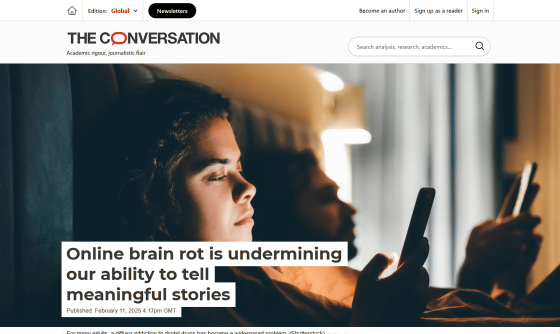Does the spread of social media 'rot the brain'?

'
Online brain rot is undermining our ability to tell meaningful stories
https://theconversation.com/online-brain-rot-is-undermining-our-ability-to-tell-meaningful-stories-248984

Modern people use social media on a daily basis through their smartphones, and some people may have found themselves spending most of their free time on social media. In teaching students about the relationship between social media and society, Kianpour says a recurring theme is that people have a hard time getting away from their smartphones and putting off productive activities.
Furthermore, when social media platforms first emerged in the early 21st century, they were hailed for their potential to empower individuals, encourage people to tell their stories, and connect communities. While social media certainly has these functions, it has also created problems, such as spreading misinformation and creating echo chambers that further polarize communities.

In our constantly connected culture, young people are comparing themselves to beauty influencers, hurting their self-esteem, and becoming immersed in a toxic bro culture that celebrates success.
Cultural theorist Byung-Chul Han argues that these are manifestations of a 'storytelling decline,' in which modern people are bombarded with a constant barrage of fragmented content and are constantly expected to engage with something, resulting in the loss of the ability to engage deeply and long-term with a story.
In 2024, a research team from the University of Toronto created a 2 minute 40 second video on the topic of 'What young workers want from work,' but students found even this length too long. In the end, the research team edited the video down to just a 16 second clip to keep students interested.

'Modern media and technology lead us to believe they can preserve our memories and protect our history,' Kianpour says. 'But memory is a paradox: every act of remembering involves forgetting and absence. Many online platforms and the content shared on them are temporary and geared towards superficial engagement rather than meaningful cultural expression. As such, these platforms can lead to
The content consumed on online platforms is merely a passing fad, with very few people giving it any real thought or engagement, and as a result, it quickly fades away and is forgotten.
Kianpour is concerned that as 'brain rot' spreads, people will lose their ability to think deeply and self-reflect, and the truth will no longer be valued. For example, it has been pointed out that US President Donald Trump often makes statements that are not factual and lies , but Trump does not care whether the statements he makes are true or false, and instead uses lies and exaggerations as a tool to convey the message he wants to convey. Kianpour suggests that voters who support Trump are no longer concerned about truth or falsehood.

In modern society, people are being bombarded with endless content, robbing them of their storytelling skills and making it difficult for them to think about meaningful stories. As German philosopher Georg Simmel pointed out in the early 20th century, 'urban dwellers are exposed to overwhelming stimuli, and as a defense mechanism they become indifferent to many things.' Something similar is happening with the Internet.
'Humans have always been fascinated by stories. We need stories to understand ourselves. But social media's profit-driven algorithms homogenize our experiences and ultimately erode cultural diversity. We have become 'storysellers' rather than storytellers,' Kianpour said.
Related Posts:
in Note, Posted by log1h_ik







